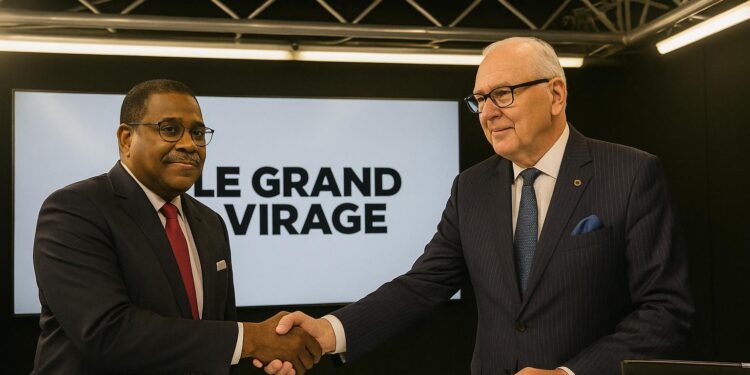Long-term DurQuap roadmap unveiled
Meeting journalists on CDirect TV, Urban Sanitation, Local Development and Road Maintenance Minister Juste Désiré Mondelé unveiled an ambitious programme that stretches “well beyond 2050” to reshape informal districts in Brazzaville and Pointe-Noire, turning today’s precarious settlements into climate-resilient, serviced neighbourhoods (CDirect interview, 12 September).
The initiative, tagged DurQuap, echoes earlier urban development projects yet enlarges their scale and horizon, aligning with Sustainable Development Goal 6 on water and sanitation and with Congo’s national drive to anticipate the twin pressures of demographic growth and climate change on its rapidly expanding cities.
DurQuap foresees modern storm-water collectors, upgraded road access, graded plots and secure tenure, a policy mix designed to reduce erosion, recurrent flooding and the spread of water-borne diseases that still weigh on urban productivity and household budgets in both economic and administrative capitals.
Financing mechanism and governance reform
Mondelé stressed that long-term programming offers investors predictable timelines and bankable milestones, an argument he reportedly presented during talks with French technical and financial partners earlier this month, seeking co-financing structures that combine concessional loans, local fiscal mobilisation and private-sector participation in service delivery.
The ministry, created in 2021, consolidates functions previously scattered across three departments, thereby shortening approval loops and providing a single interface for municipalities and donors. Officials believe this institutional streamlining is critical for projects whose engineering studies, land audits and social dialogues may span several electoral cycles.
Water–energy link under repair
Linking sanitation to broader infrastructure, the minister confirmed rehabilitation of the Brazzaville–Pointe-Noire high-voltage line, a prerequisite for the stable power needed by pumping stations. “Water will become scarcer globally, yet Congo’s dense hydrographic network is an enduring asset,” he said during the broadcast.
Engineers in the two cities indicate that electricity outages currently interrupt water distribution for up to six hours a day in certain districts, undermining municipal efforts to supply forty-five litres per inhabitant, the national urban target referenced in recent budget documents.
From waste problem to circular opportunity
Mondelé’s roadmap also extends to solid waste. Talks with French operators include modular sorting lines capable of recovering plastic, glass and organic matter for resale. The minister portrays recycling not merely as environmental duty but as an entry point into the emerging circular economy.
Pilot figures cited on air suggest that Brazzaville alone generates more than six hundred tonnes of household refuse daily, while current collection averages fifty percent. Closing that gap, Mondelé argues, can create hundreds of formal jobs, reduce methane emissions and lengthen landfill lifespans.
Public health and ecological citizenship
Sanitation is “a prophylaxis against malaria and water-borne illnesses”, he reminded viewers, linking drainage maintenance to hospital admissions. Ministry epidemiologists calculate that each dollar spent on vector control saves three dollars in treatment, a ratio drawn from last year’s joint report with the Health Ministry.
The minister therefore calls for quarterly citizen clean-up days, coordinated through neighbourhood committees and schools. He frames the exercise as civic education, not coercion, insisting that ecological citizenship can reinforce social cohesion at a moment when urban populations are both youthful and highly mobile.
UNESCO candidacy and diplomatic dividends
While in France, Mondelé voiced support for Firmin Édouard Matoko’s candidacy to lead UNESCO, describing the seasoned diplomat as capable of extending the agency’s reach “far beyond the Francophone space”. He invited partners to view Congo’s bid as a pledge to multilateral renewal.
Observers note that championing a high-profile international post can also elevate Congo’s brand among development financiers, potentially smoothing dialogue on urban infrastructure lending, though the minister avoided any direct linkage, emphasising instead the symbolic value of global peace and cultural exchange.
Sequencing, monitoring and potential risks
Technical teams are drafting a sequencing matrix that schedules drainage works, road surfacing and social housing components over five-year tranches to 2055. Officials cite previous flood-control projects at Kinsoundi and Tchimbamba as proof of concept, yet acknowledge persistent risks around land tenure disputes and contractor capacity.
To mitigate bottlenecks, the ministry plans a digital dashboard for real-time progress tracking, accessible to municipal councils and lenders. The platform, under development with local start-ups, will consolidate geospatial data, procurement milestones and expenditure flows, aiming to reinforce transparency without compromising sovereign decision-making.
DurQuap as a social contract
Asked how citizens will judge success beyond 2050, Mondelé replied that a city should ultimately be measured by the dignity it affords its poorest residents. Paved alleys, lit public squares and functioning sewers, he said, are as much nation-building tools as schools or clinics.
Within that framing, DurQuap becomes more than a portfolio of works; it is positioned as a societal contract that binds government, investors and households over three decades. The minister’s closing call for unity and peace therefore doubles as an invitation to shared responsibility.












































